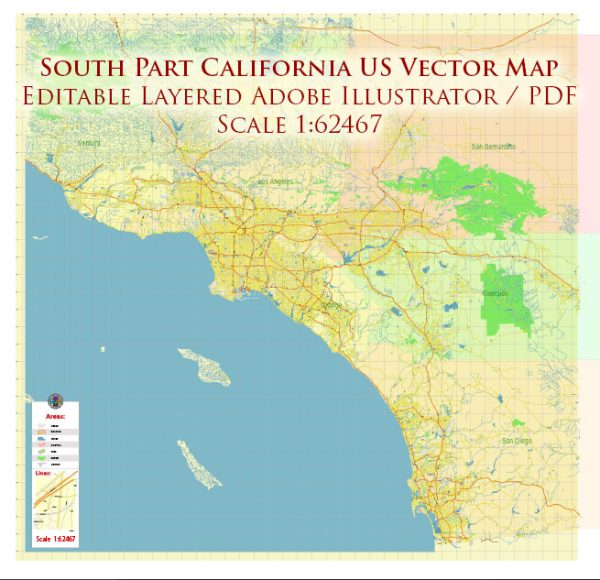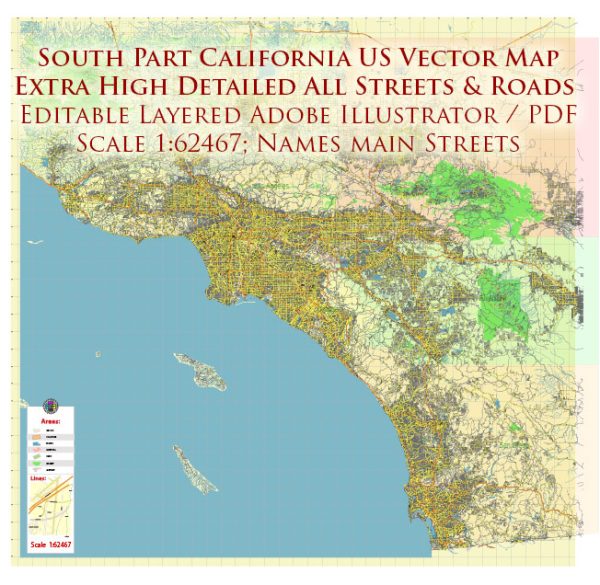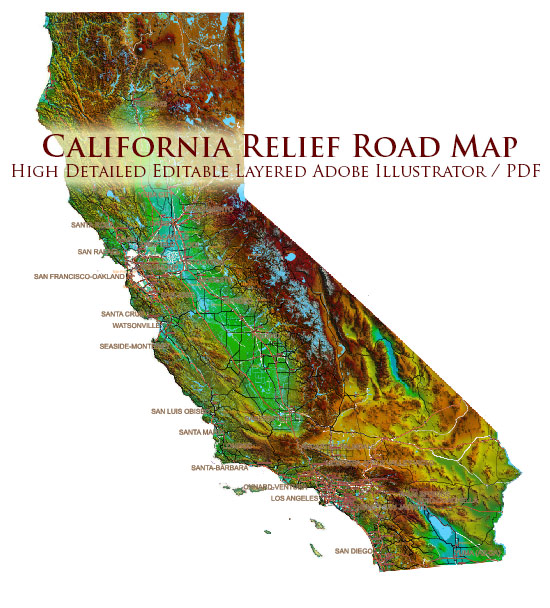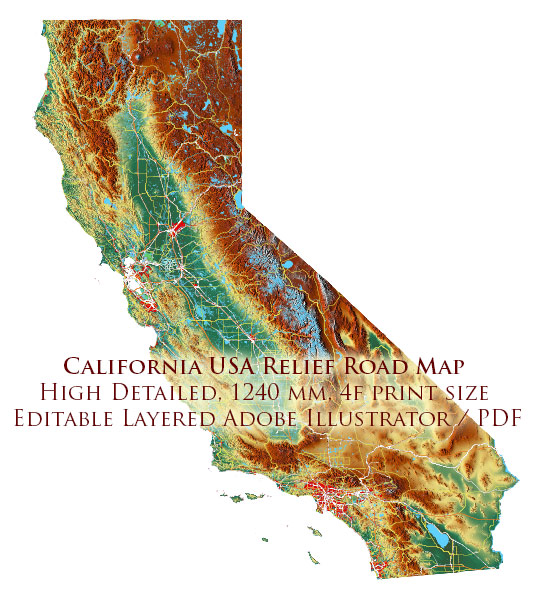San Jose, California, US, printable vector map street City Plan V.3.08.2016 full editable, Adobe Illustrator, full vector, scalable, editable text format street names, 19 mb ZIP
All streets, All buildings. Map for design, printing, arts, projects, presentations, for architects, designers and builders, business, logistics.
The most exact and detailed map of the city.
DWG, DXF, CDR and other formats – on request, same price, please, contact
San Jose, California, USA.
This vector map of San Jose is used as a basis for design, editing, and further printing.
This is the most detailed, exact map of San Jose for high-quality printing and polygraphy. You can always clarify the map development date by contacting us.
For your convenience, all objects on San Jose vector map are divided into layers. And the editing is very easy – colors, lines, etc.
You can easily add any objects needed (e.g. shops, salons, sale points, gas station or attraction) on any layer of San Jose vector map.
San Jose is an economic, cultural and political center of Silicon Valley, and the largest city in Northern California (both in population and area). With an estimated 2017 population of 1,035,317, it is the third-most populous city in California (after Los Angeles and San Diego) and the tenth-most populous in United States. Located in the center of the Santa Clara Valley, on the southern shore of San Francisco Bay, San Jose covers an area of 179.97 square miles (466.1 km2). San Jose is the county seat of Santa Clara County, the most affluent county in California and one of the most affluent counties in the United States. San Jose is the most populous city in both the San Francisco Bay Area and the San Jose-San Francisco-Oakland Combined Statistical Area, which contain 7.7 million and 8.7 million people respectively.
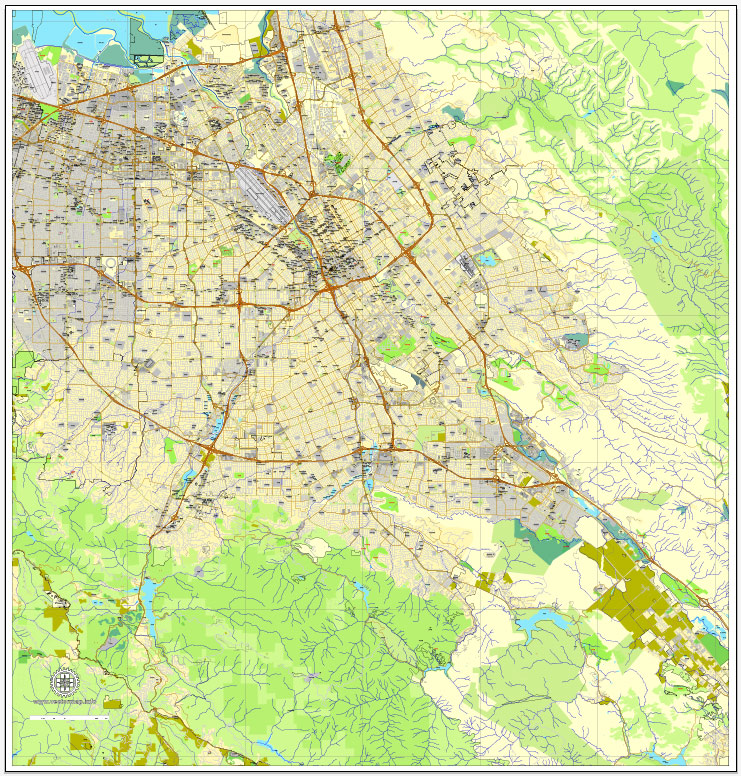
One of the advantages of San Jose vector maps of our production is the relevance of cartographic data, we constantly update all our products.
This vector map of San Jose is used by:
designers, layout designers, printers, advertisers and architects. Our product – vector maps – is designed for further editing and printing in large formats – from @Wall format (a few meters) to A-0 and A-1, A-2, A-3.
San Jose map in vector format is used for design, urban planning, presentations and media visualizations.
Advertising and presentation map of San Jose (usually the final designer marks the routes, and puts the client’s objects (shops, saloons, gas stations etc.)
The undoubted advantage is that people will NEVER throw out this advertising product – the map. In fact, as an advertising medium, a map is the most “long-playing” of the well-known polygraphic advertising media, with the longest lifespan, and the maximum number of interactions with the customer.
For travelers, maps are sold at the airports and gas stations around the world. Often the source is our vector maps.
Take a look, who purchases our vector maps of San Jose in “Our Clients and Friends” page – these are large and small companies, from super-brands like Volvo and Starbucks, to small design studios and printing houses.
It’s very easy to work with vector maps of San Jose, even for a not very experienced designer who can turn on and off the map layers, add new objects, change the colors of fill and lines according to customer requirements.
The undoubted advantage of San Jose vector maps in printing is an excellent and detailed visualization, when customer can expand a large paper map and instantly define his location, find a landmark, an object or address on map, unlike using the popular electronic formats of Google and Yandex maps for example.
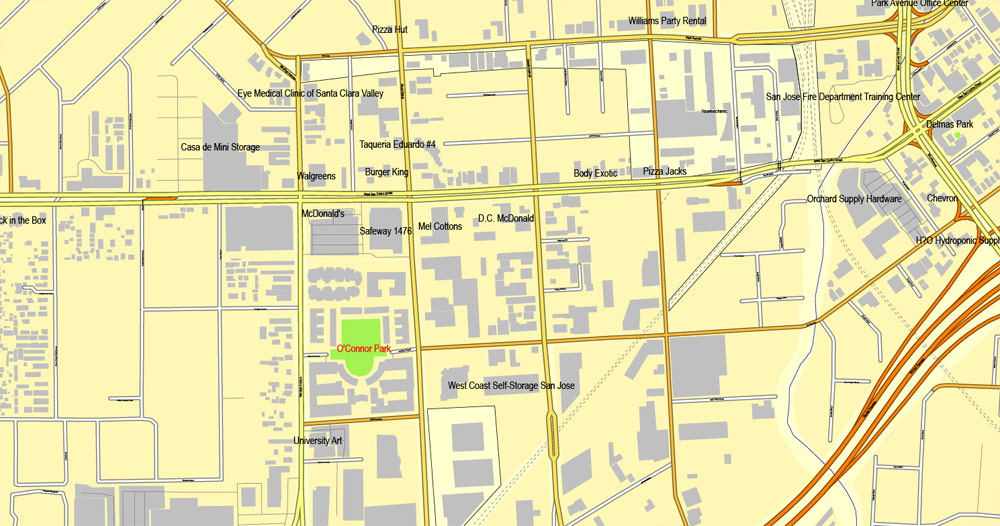
Printable vector maps of San Jose are much more convenient and efficient than any electronic maps on your smartphone, because ALL DETAILS are displayed in the entire space of San Jose map.
Useful tips on working with vector maps of cities and countries in Adobe Illustrator.
«V» – launches the Selection tool (cursor, black arrow), which makes active any vector line.
«А» – launches the Direct Selection tool (white cursor), allows you to select curve elements and drag them to the desired place.
«R» – activates the Rotate tool, which helps you rotating selected objects around the center point by 360 degrees.
«E» – gives you the opportunity to use the Eraser tool and erase unnecessary parts.
«X» – switches between Fill and Stroke in the Tools section. Try to get used to this hot key and
you will quickly understand that you can’t live and work without it.
Guides are not limited to vertical and horizontal in Adobe Illustrator. You can also create a diagonal guide for example. Moreover, you can turn any contours into guides. Select the outline and go to View > Guides > Make Guides (Create Guides), or simply press Cmd/Ctrl + 5. You can also turn the guides back into an editable object. Go to menu, View > Guides > Unlock Guides (Release Guides), select the guide you want to edit and select View > Guides > Release Guides (Reset Guides), or just press Cmd/Ctrl + Option / Alt + 5).
San Jose is a global city, notable as a center of innovation, for its affluence, Mediterranean climate, and extremely high cost of living. San Jose’s location within the booming high tech industry, as a cultural, political, and economic center has earned the city the nickname “Capital of Silicon Valley”. San Jose is one of the wealthiest major cities in the United States and the world, and has the third highest GDP per capita in the world (after Zürich, Switzerland and Oslo, Norway), according to the Brookings Institution. The San Jose Metropolitan Area has the most millionaires and the most billionaires in the United States per capita. With a median home price of $1,085,000, San Jose has the most expensive housing market in the country and the fifth most expensive housing market in the world, according to the 2017 Demographia International Housing Affordability Survey. Major global tech companies including Cisco Systems, eBay, Adobe Systems, PayPal, Brocade, Samsung, Acer, Hewlett Packard Enterprise, and Western Digital maintain their headquarters in San Jose, in the center of Silicon Valley.

You will probably want to change the color scheme used on our San Jose vector map.
To quickly and effectively play with colors.
Of course, you can do it manually, all objects in our San Jose vector map are divided according to types and layers, and you can easily change the color gamma of vector objects in groups and layers.
But there is more effective way of working with the whole VECTOR MAP of San Jose and all layers:
The overview dialog «Edit colors»/«Repaint Graphic Object» (this dialog box name can change depending on the context):
If you have selected a part or a layer of San Jose vector map and open the dialog box by clicking the icon in the Control panel, on the Samples palette or the Color Catalog, or if you choose Edit > Edit Colors> Repaint Graphic Object, then the «Repaint Graphic Object» dialog box appears, and you get access to «Assign» and «Edit» tabs.
If a picture or a map fragment is not selected, and you open the dialog box by clicking the icon in the Control panel, on the Samples palette or in the Color Catalog, the «Edit Colors» dialog box appears and you can only access the «Edit» tab.
Regardless of the name at the top of the dialog box, the right-hand side always displays the color group of the current document, as well as two default color groups: Print Color and Grayscale. These color groups can be selected and used any time.
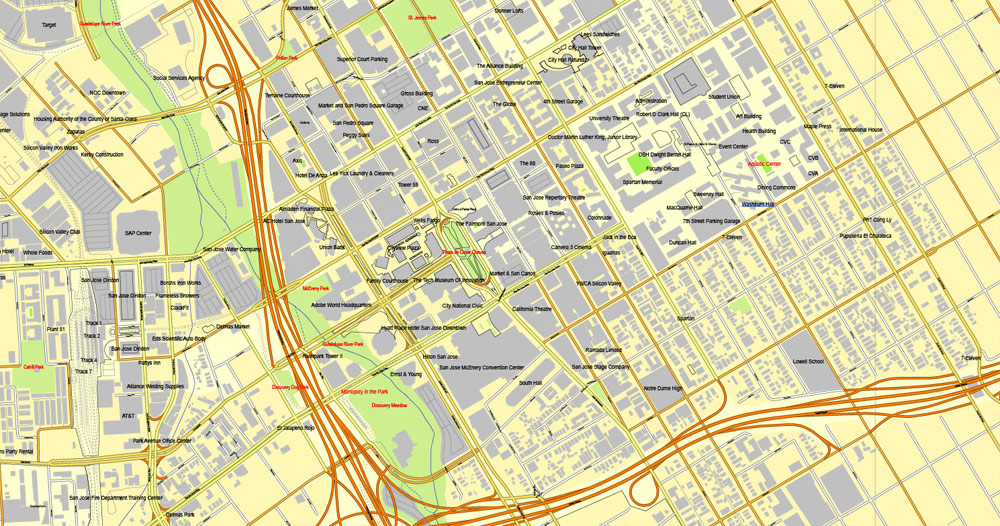
Create and edit color groups of San Jose vector map, and also assign colors using the «Edit Colors»/ а «Repaint Graphic Object» dialog box.
A. Creating and editing of a color group on the «Edit» tab
B. Assigning colors on the «Assign» tab
C. Select a group of colors from the «Color groups» list
The option «Repaint a graphic object» in the lower part of the dialog box allows you to preview the colors on a selected layer of Vector map, or a group of elements, and specify whether its colors will be redefined when the dialog box is closed.
The main areas of the dialog box are:
«Edit»
The «Edit» tab is designed to create a new or edit the existing color groups.
The harmony rules Menu and the Color Wheel are used to conduct experiments with color harmonies. The color wheel shows how colors are related in color harmony, and the color bars allow you to view and manipulate an individual color values. In addition, you can adjust the brightness, add and remove colors, save color groups and view colors on the selected Vector Map of San Jose or a separated layers.
«Assign»
The «Assign» tab is used to view and control on how the original colors are replaced with colors from the color group like your corporate colors in the Vector Map of San Jose.
The assign color ability is provided only if the entire map, layer or fragment is selected in the document. You can specify which of new colors replace the current colors, whether the spot colors should be preserved and how colors are replaced (for example, you can replace colors completely or changing the color tone while maintaining the brightness). The «Assign» tab allows you to redefine colors in the Vector Map of San Jose, or in separate layers and fragments using the current color group or reducing the number of colors in the current Vector Map.
Color groups
Is a list of all saved color groups for current document (the same groups appear in the «Samples» palette). You can edit and delete the existing color groups, as well as creating a new ones using the list of “Color Groups” in the dialog box. All changes appear in the «Samples» palette.
The highlighted color group shows, which color group is currently edited.
Before the arrival of the Spanish, the area around San Jose was inhabited by the Tamien nation of the Ohlone peoples of California. San Jose was founded on November 29, 1777, as the Pueblo de San José de Guadalupe, the first city founded in the Californias. It then became a part of Mexico in 1821 after the Mexican War of Independence. Following the American Conquest of California during the Mexican–American War, the territory was ceded to the United States in 1848. After California achieved statehood two years later, San Jose became the state’s first capital. Following World War II, San Jose experienced an economic boom, with a rapid population growth and aggressive annexation of nearby cities and communities carried out in the 1950s and 1960s. The rapid growth of the high-technology and electronics industries further accelerated the transition from an agricultural center to an urbanized metropolitan area. Results of the 1990 U.S. Census indicated that San Jose had officially surpassed San Francisco as the most populous city in Northern California. By the 1990s, San Jose and the rest of Silicon Valley had become the global center for the high tech and internet industries, making it California’s fastest-growing economy.
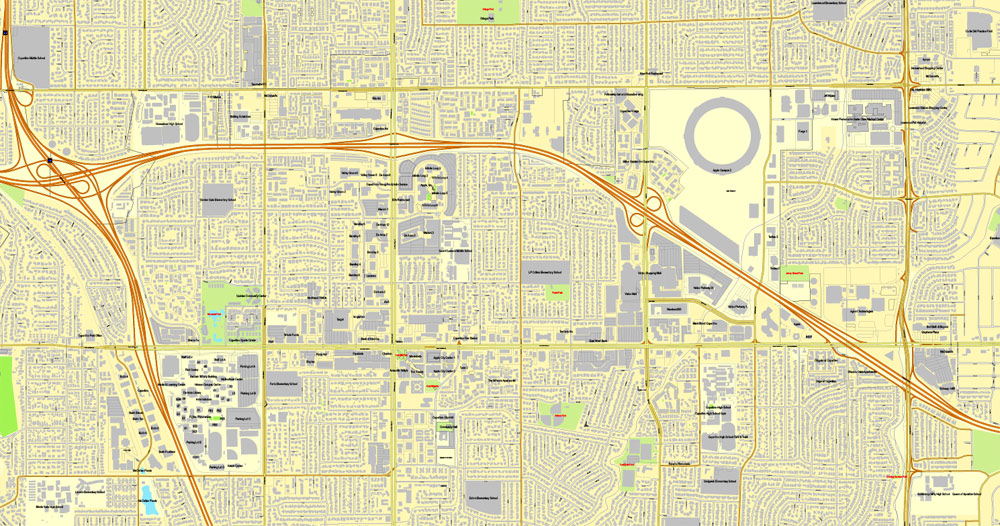
Any color group can be selected and edited, or used to redefine the colors in the selected vector map of San Jose , its fragments or elements.
Saving a color group adds this group to the specified list.
Opening the «Edit Colors»/«Repaint Graphic Object» dialog box.
Open the «Edit Colors»/«Repaint Graphic Object» dialog box using one of the following methods:
«Edit»> «Edit Colors»> «Repaint Graphic object» or «Repaint With Style».
Use these commands if you need to edit the colors in the selected vector map of San Jose.
«Repaint Graphic object» button on the «Control» panel.
Use this button if you need to adjust colors of San Jose vector map using the а «Repaint graphic object» dialog box.
The specified button is available if the selected vector map or its fragment contains two or more colors.
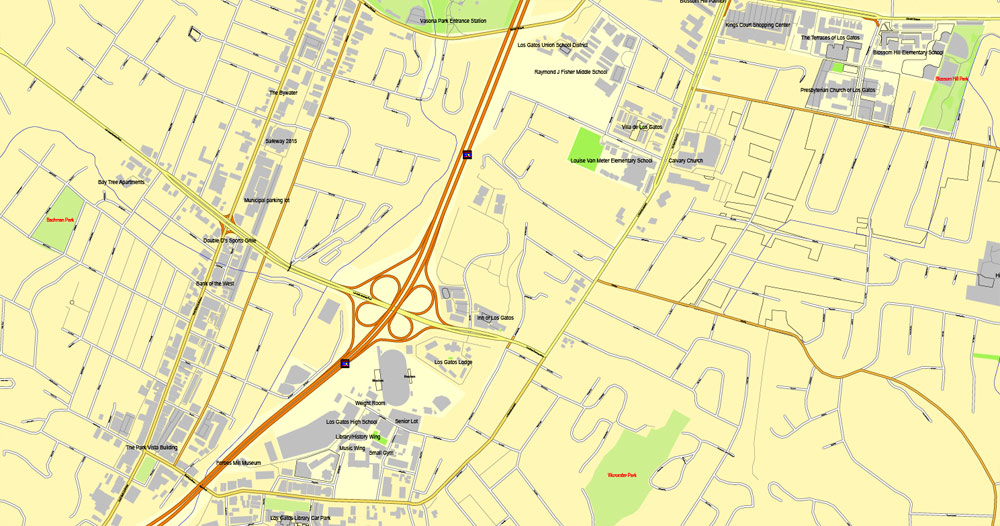
Note. This color editing method is convenient for global color adjustment in a vector map, if global colors were not used when creating a Map of San Jose.
The «Edit colors» button or «Edit or apply colors» on the «Color Catalog» palette
Click this button if you need to edit colors on the «Color Catalog» palette or edit and then apply them to the selected Vector Map of San Jose or its fragment.
The «Edit color group» button or «Edit or apply color group» on the «Samples» palette.
Click this button if you need to edit the colors in the specific color group or edit and apply them to the selected Vector Map of San Jose or a group of its elements, for example, the whole layer “Streets and lines”. You can also double-click the color group in the Samples panel to open the dialog box.
If the map file is too large and your computer freezes or even can’t open it quickly:
1. Try to reduce the color resolution of the video card (display) to 256 colors while working with a large map.
2. Using Windows Task Manager, select all the application you don’t need, while working with map, just turn them off.
3. Launch Adobe Illustrator. (DO NOT OPEN the vector map file)
4. Start the Windows Task Manager using administrator rights > Find the “Illustrator” process > set the «real time» priority,
5. Open the file. When you see the LEGACY FONT popup window – click “OK” (do not update). You can restore the TEXT later.
6. Can also be useful: When file is opened – Edit > Settings > Basic Settings > disable smoothing. /// It looks scary, but works quickly)))
We recommend saving the file in Adobe Illustrator 10 version. It’s much more stable when working with VERY BIG size files.
San Jose is located at 37°20′07″N 121°53′31″W. According to the United States Census Bureau, the city has a total area of 180.0 sq mi (466 km2), of which 3.4 sq mi (8.8 km2) (1.91%) is water, making it the fourth-largest California city by land area (after Los Angeles, San Diego and California City).
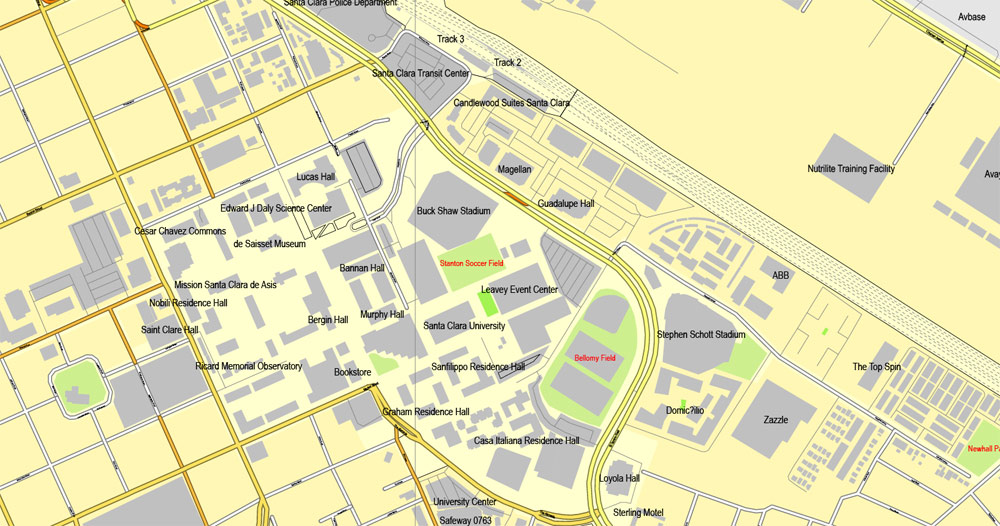
San Jose lies between the San Andreas Fault, the source of the 1989 Loma Prieta earthquake, and the Calaveras Fault. San Jose is shaken by moderate earthquakes on average one or two times a year. These quakes originate just east of the city on the creeping section of the Calaveras Fault, which is a major source of earthquake activity in Northern California. On April 14, 1984, at 1:15 pm local time, a 6.2 magnitude earthquake struck the Calaveras Fault near San Jose’s Mount Hamilton. The most serious earthquake, in 1906, damaged many buildings in San Jose as described earlier. Earlier significant quakes rocked the city in 1839, 1851, 1858, 1864, 1865, 1868, and 1891. The Daly City Earthquake of 1957 caused some damage. The Loma Prieta earthquake of 1989 also did some damage to parts of the city. The other faults near San Jose are the Monte Vista Fault and the Hayward Fault Zone.
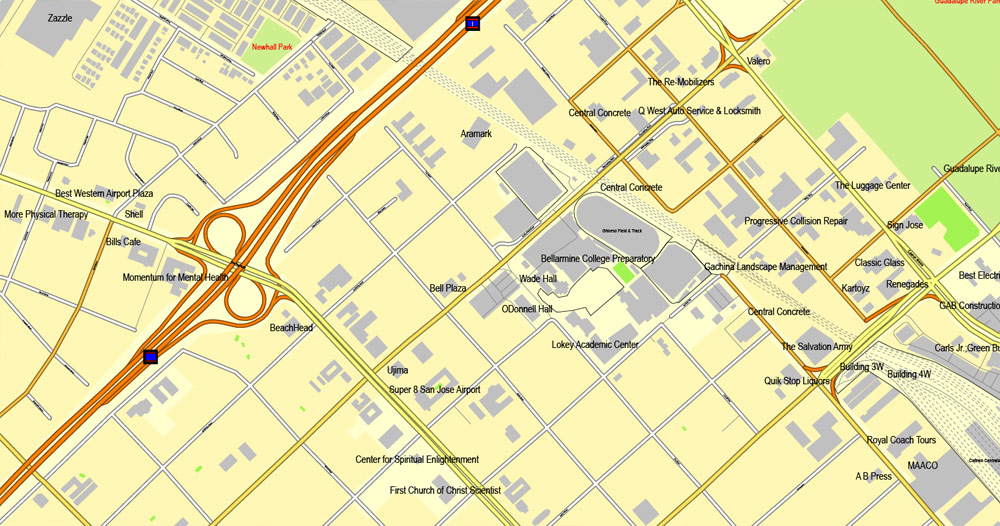
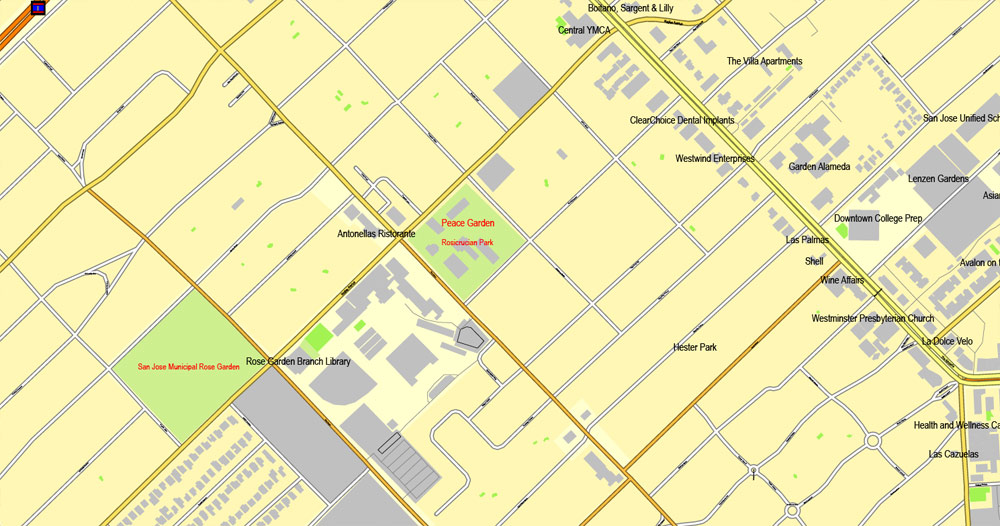
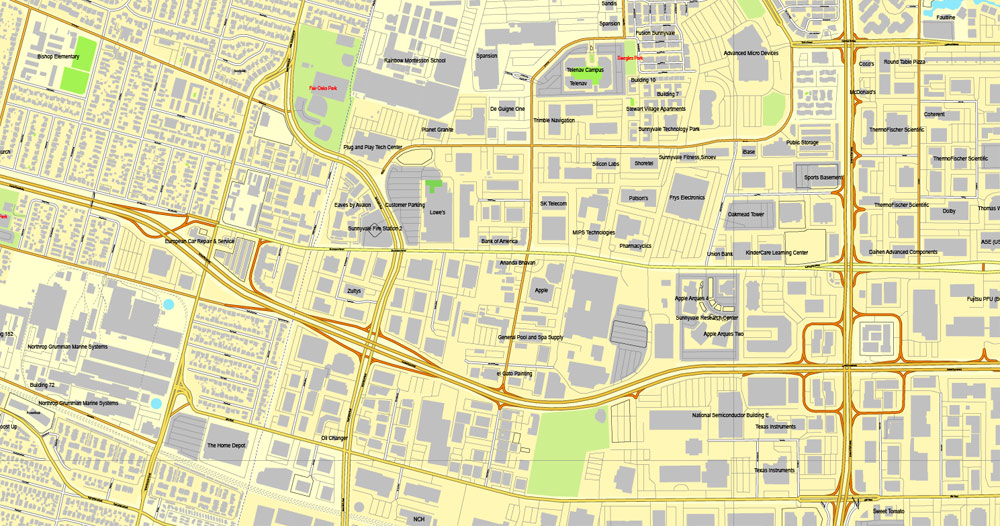
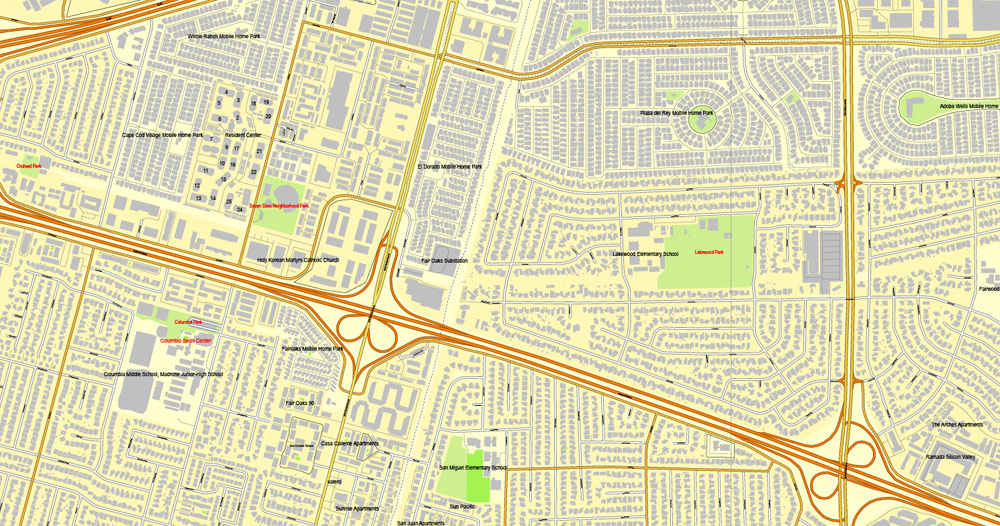
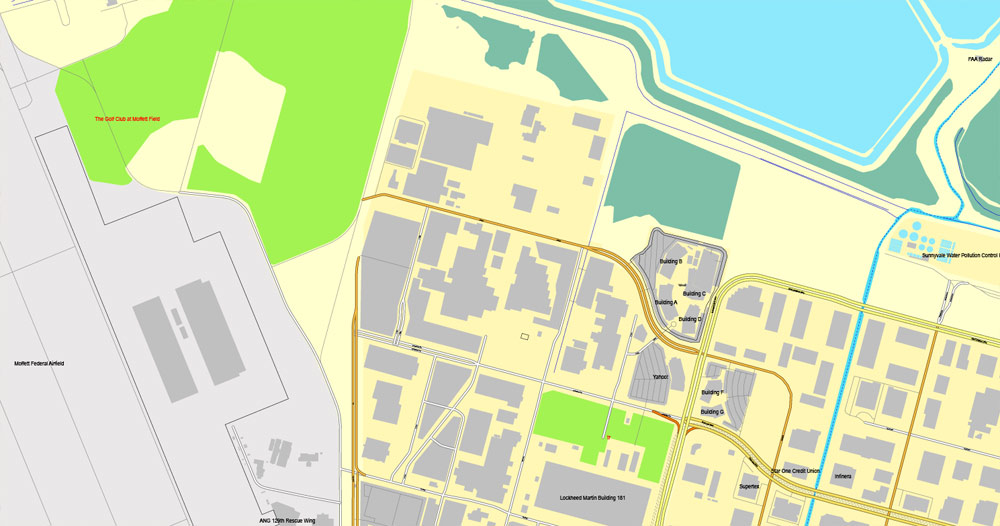
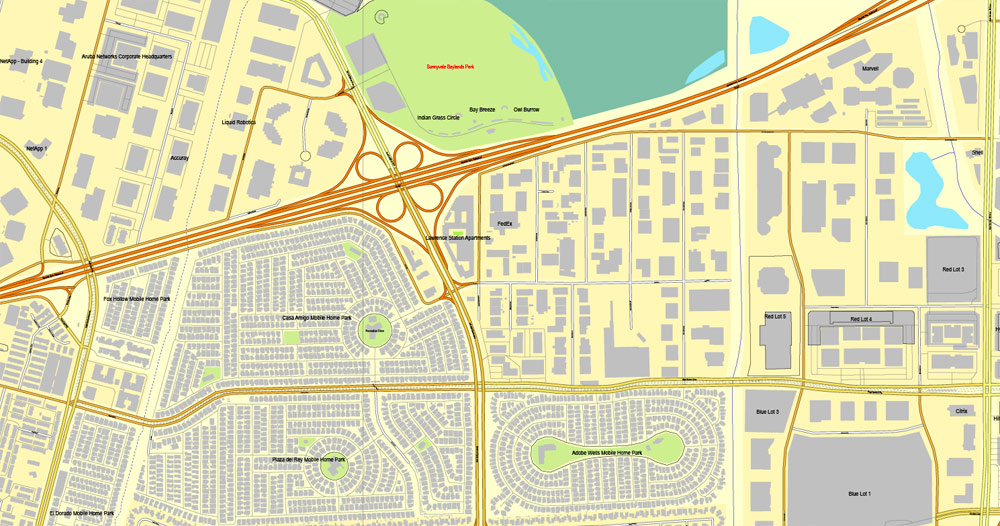
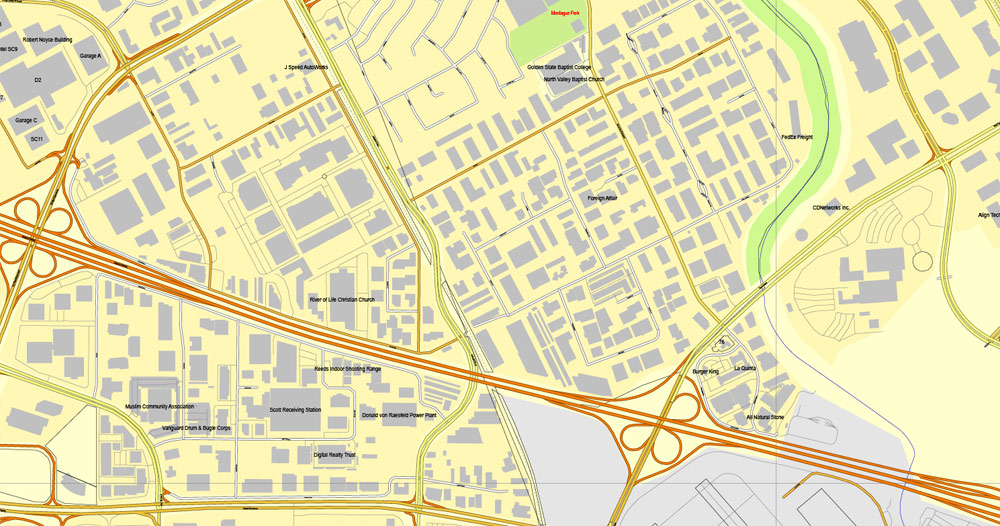
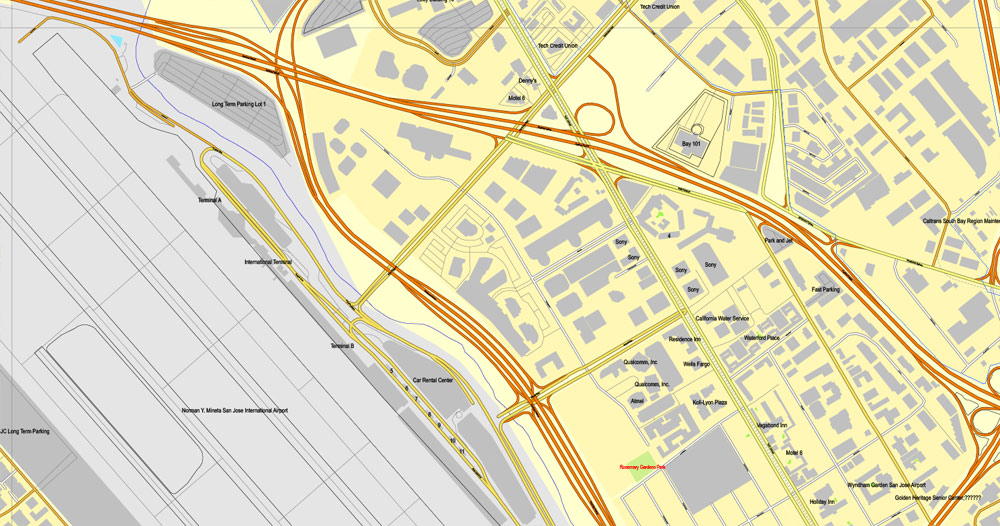
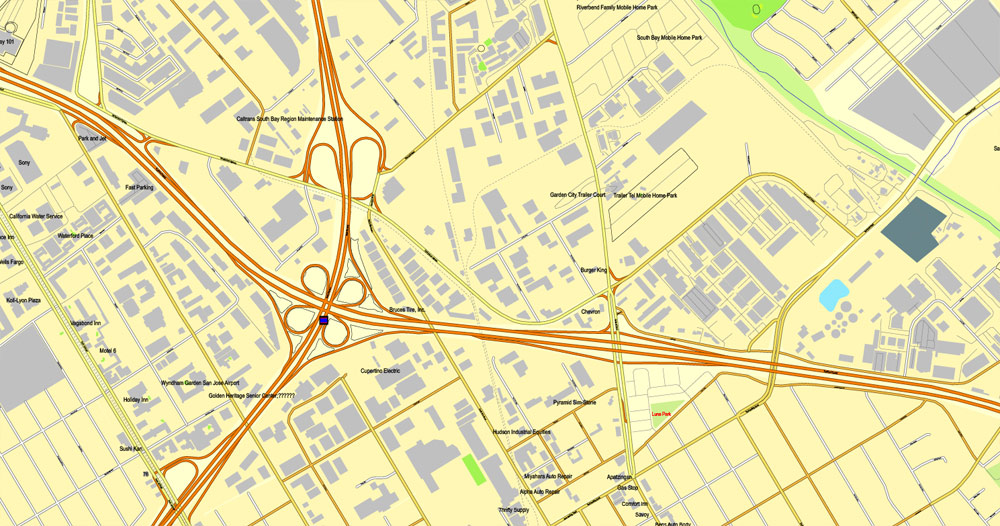
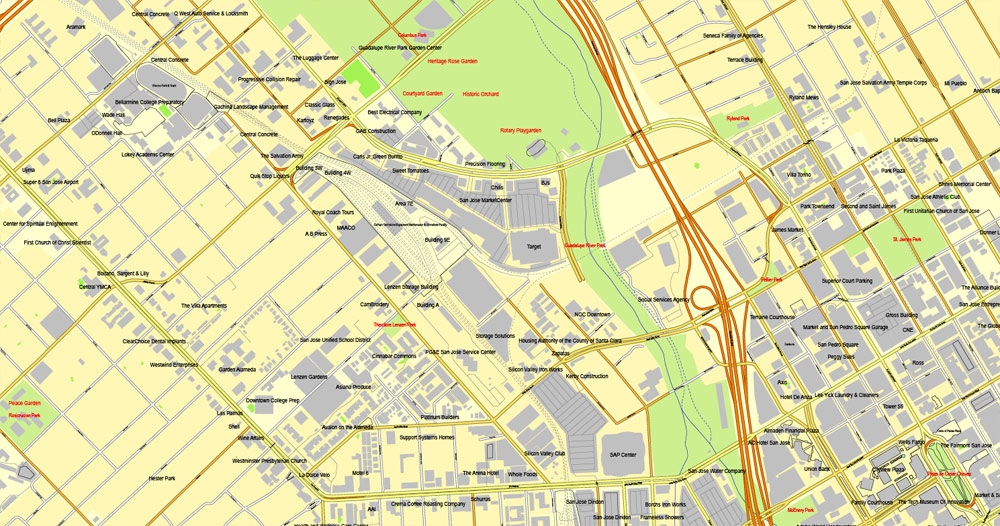
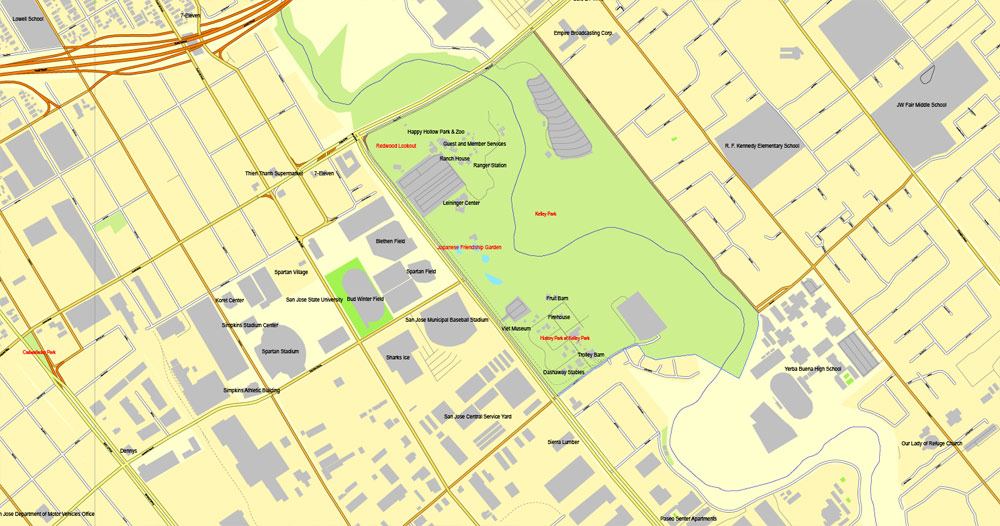
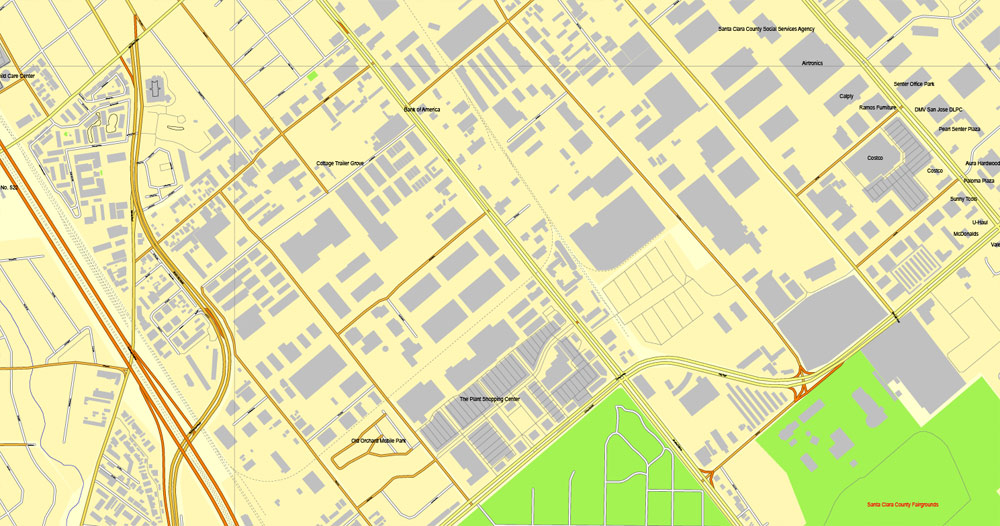
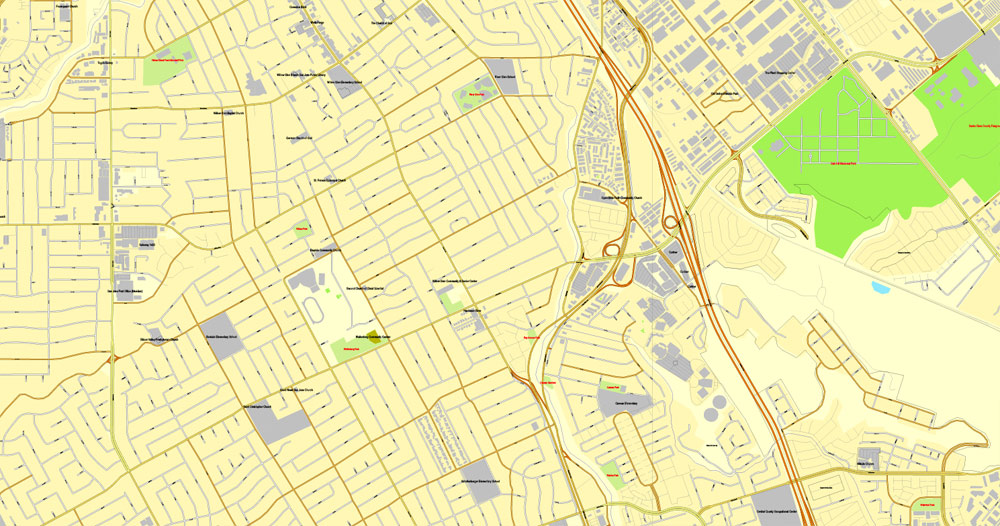

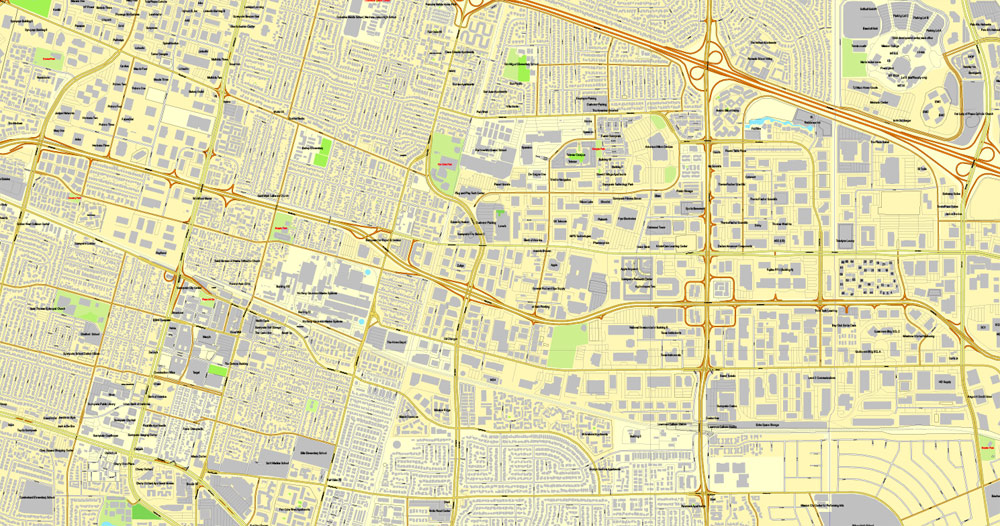
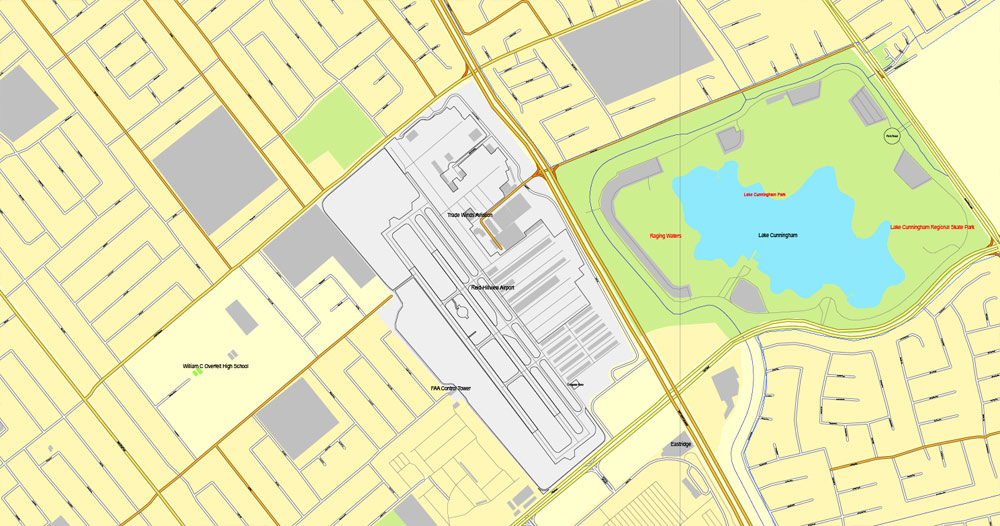
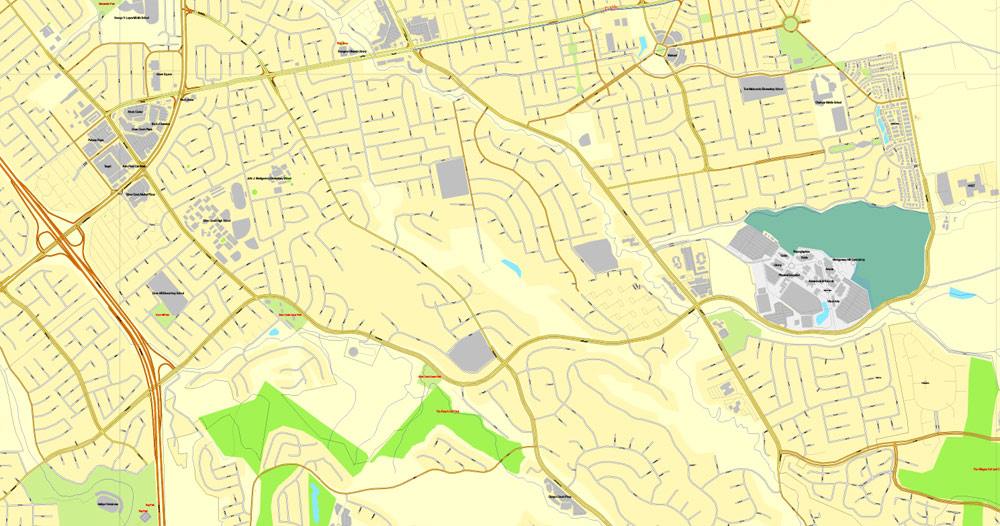
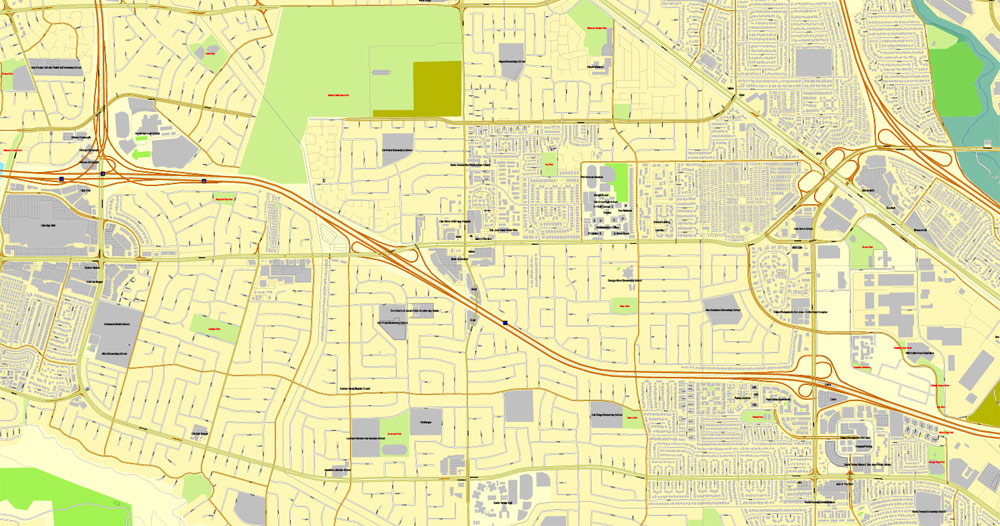
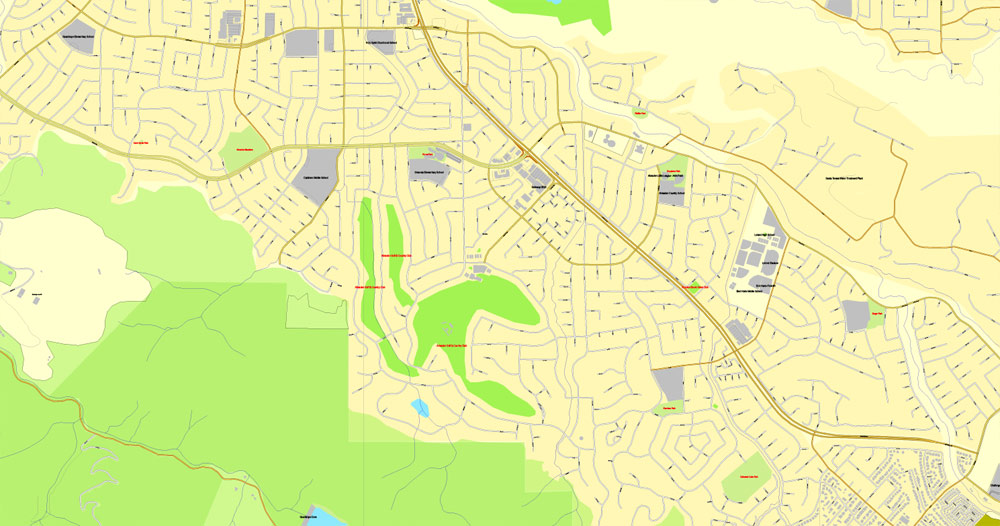
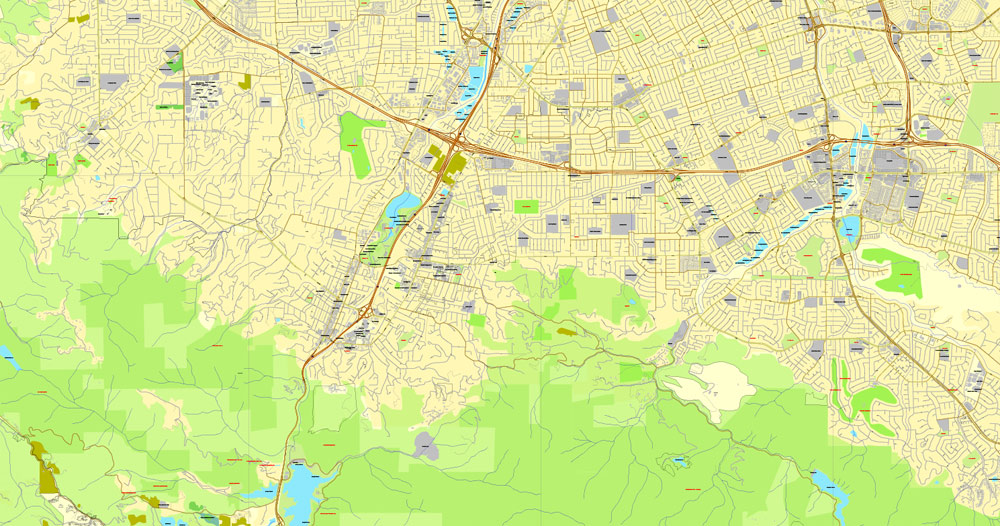
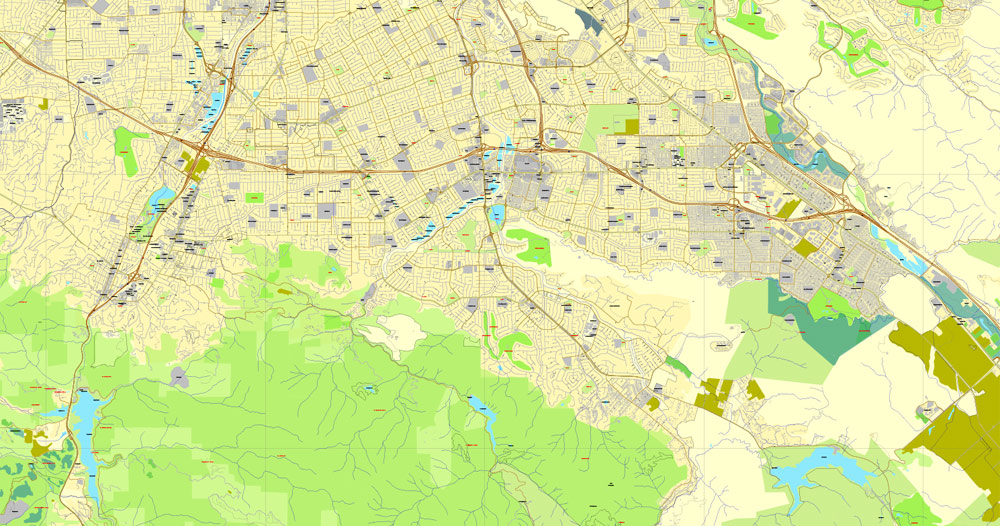
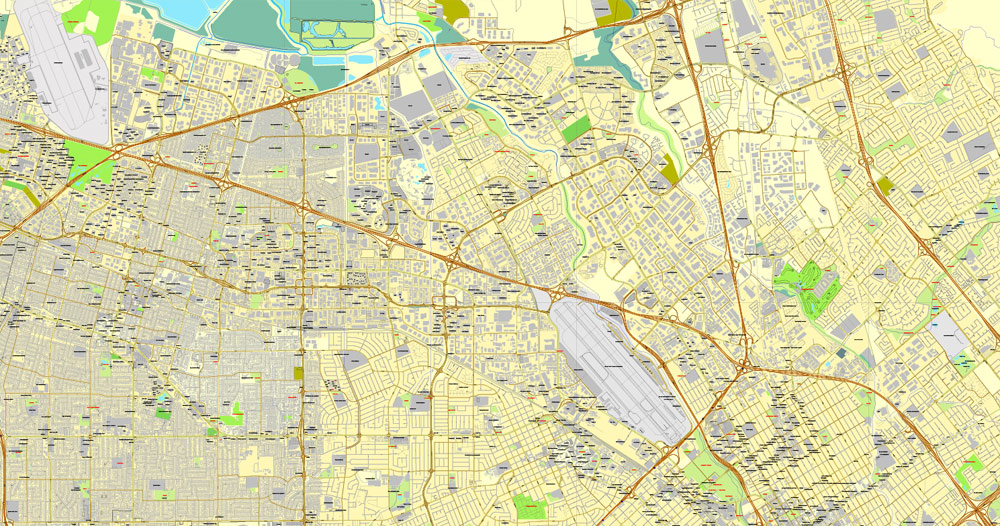
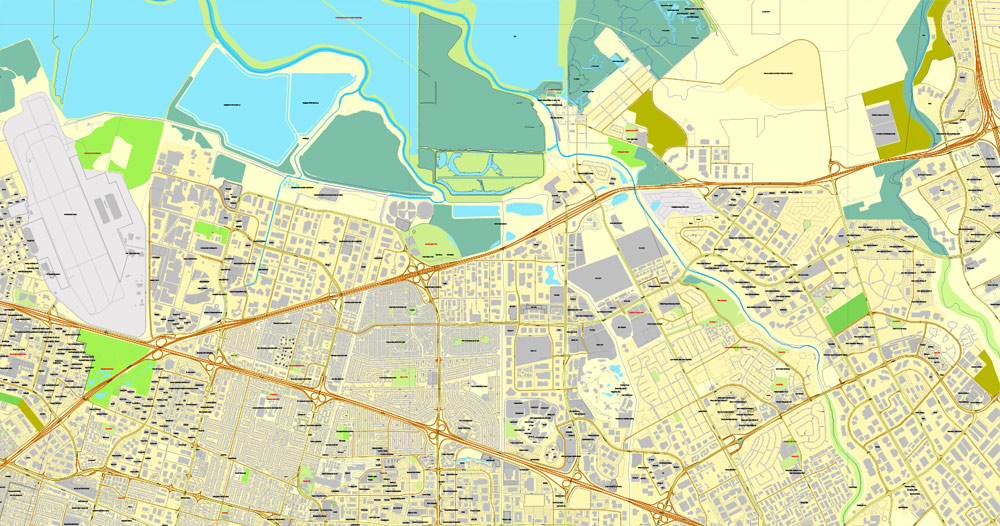
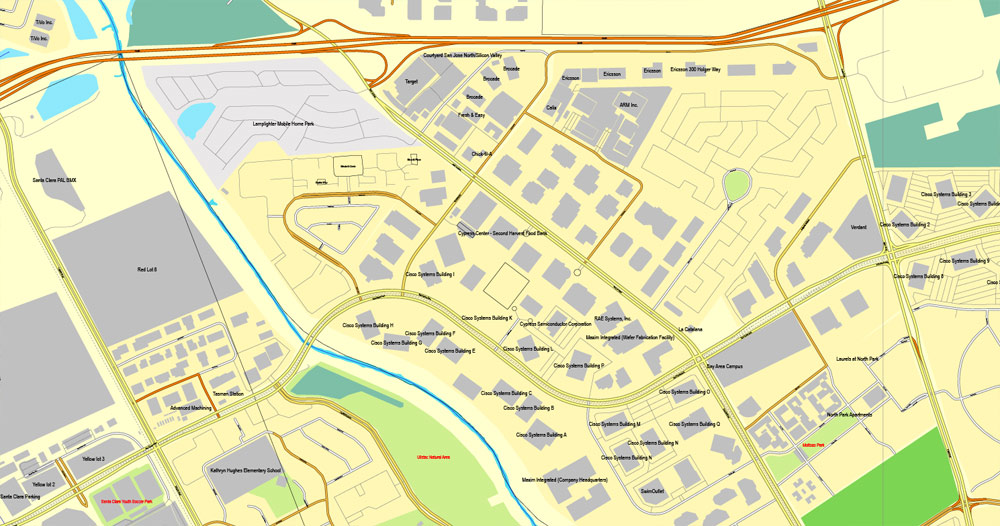
San Jose, California
San Jose, originally Pueblo de San Jose de Guadalupe and officially the City of San Jose, is the third-largest city by population in California, the tenth-largest by
population in the United States, and the county seat of Santa Clara County. San Jose is the largest city within the Bay Area and the largest city in Northern California.
Before the arrival of the Spanish, the area around San Jose was inhabited by the Ohlone people. San Jose was founded on November 29, 1777, as San Jose de Guadalupe, the
first civilian town in the Spanish colony of Alta California. The city served as a farming community to support Spanish military installations at San Francisco and
Monterey. When California gained statehood in 1850, San Jose served as its first capital.
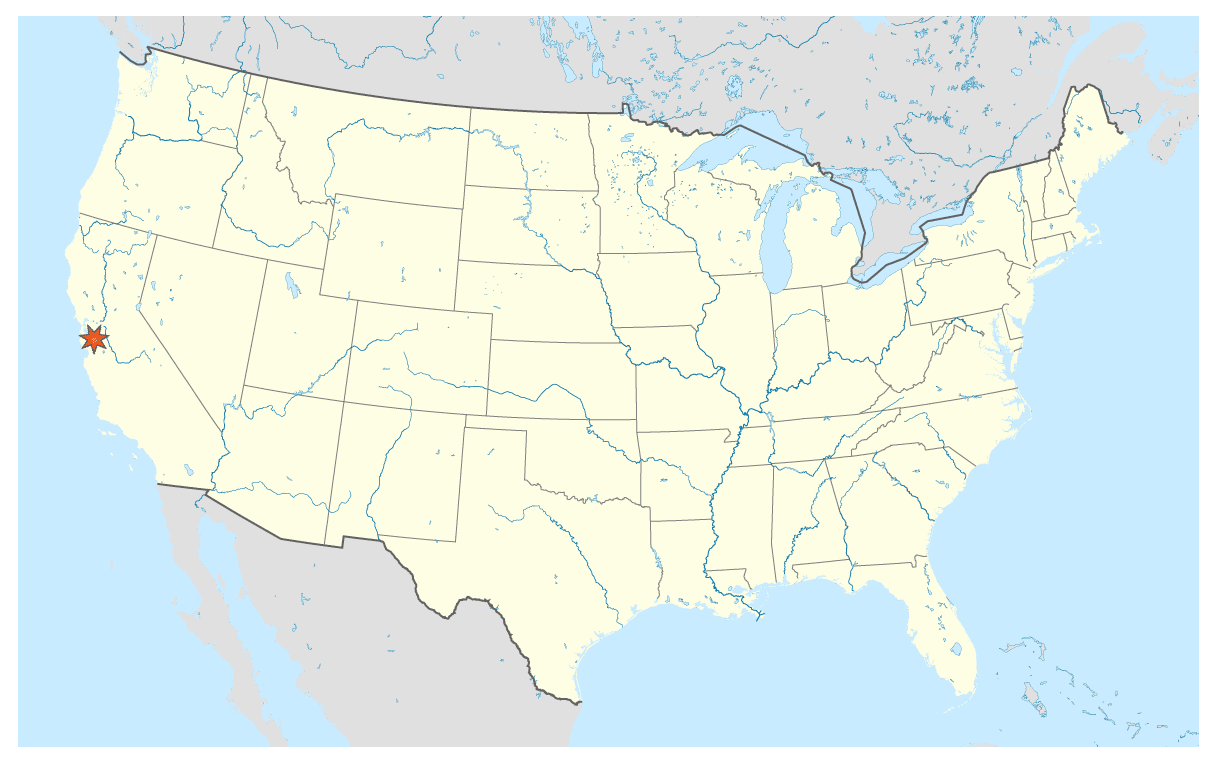
Download free this vector map San Jose Location in Adobe Illustrator >>>>>
San_Jose_Free_Vector_Map_Usa_location_map.ai
After more than 150 years as a small farming community, the San Jose area in the mid-20th century contained some of the last undeveloped land near San Francisco Bay. It
then began to experience rapid population growth, much of it coming from veterans returning from World War II. San Jose then continued its aggressive expansion during the 1950s and 1960s by annexing more land area. The rapid growth of the high-technology and electronics industries further accelerated the transition from an agricultural
center to an urbanized metropolitan area.
By the 1990s, San Jose’s location within the booming local high tech industry earned the city the nickname “Capital of Silicon Valley“. San Jose is now considered to be a
global city, and notable for its affluence and high cost of living. The U.S. Census Bureau estimated the population of the city to be 1,015,785 as of July 1, 2014.
Area
• City 179.97 sq mi (466.109 km2)
• Land 176.526 sq mi (457.201 km2)
• Water 3.439 sq mi (8.908 km2) 1.91%
• Urban 286.113 sq mi (741.03 km2)
• Metro 2,694.61 sq mi (6,979 km2)
Elevation 82 ft (25 m)
Highest elevation 2,125 ft (648 m)
Lowest elevation 0 ft (0 m)
Population (July 1, 2014)
• City 1,015,785
• Rank 1st in Santa Clara County
3rd in California
10th in the United States
• Density 5,600/sq mi (2,200/km2)
• Urban 1,894,388 (29th)
• Metro 1,976,836 (34th)
• CSA 8,713,914 (5th)
Demonym(s) San Josean
Time zone Pacific Time Zone (UTC?8)
• Summer (DST) PDT (UTC?7)
ZIP codes 95002, 95101, 95103, 95106, 95108–95113, 95115–95141, 95148, 95150–95161, 95164, 95170, 95172, 95173, 95190–95194, 95196
Area codes 408/669
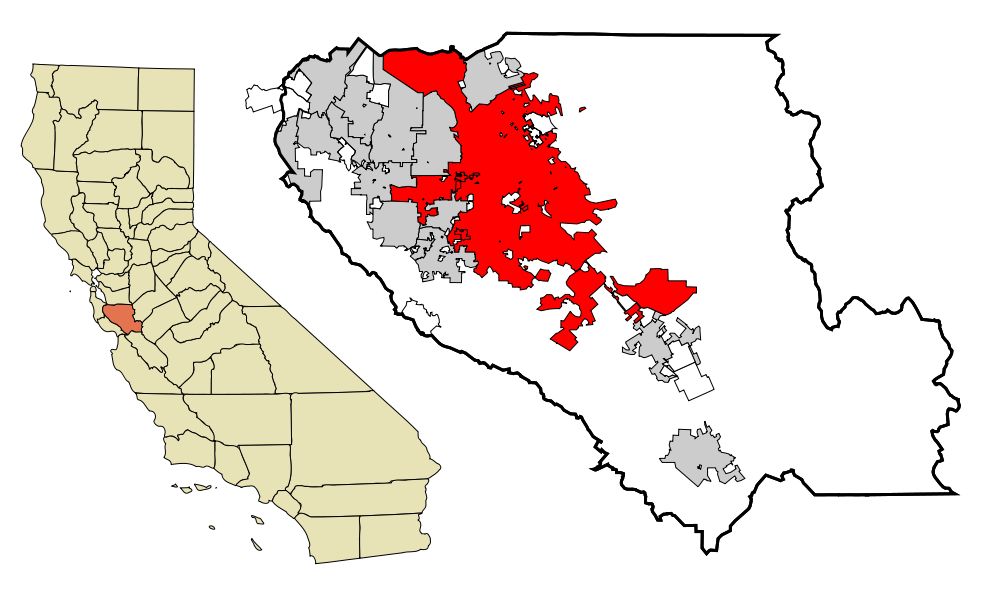
Download free this vector map in Adobe Illustrator >>>>>
Santa_Clara_County_California_Incorporated_and_Unincorporated_areas_San_Jose_Highlighted.ai
Geography
San Jose is located at 37°20?07?N 121°53?31?W. According to the United States Census Bureau, the city has a total area of 180.0 sq mi (466 km2), of which 3.4 sq mi (8.8
km2) (1.91%) is water.
San Jose lies between the San Andreas Fault, the source of the 1989 Loma Prieta earthquake, and the Calaveras Fault. San Jose is shaken by moderate earthquakes, above four
on the Richter Scale, on average of one to two times a year. These quakes originate just east of the city on the creeping section of the Calaveras Fault, which is a major
source of earthquake activity in Northern California. On April 14, 1984, at 1:15 pm, local time a 6.2 magnitude earthquake struck the Calaveras Fault near San Jose’s Mount Hamilton. The most serious earthquake, in 1906, damaged many buildings in San Jose as described earlier. Earlier significant quakes rocked the city in 1839, 1851, 1858, 1864, 1865, 1868, and 1891. The Daly City Earthquake of 1957 caused some damage. The Loma Prieta earthquake of 1989 also did some damage to parts of the city. The other
faults near San Jose are the Monte Vista Fault and the Hayward Fault Zone.
https://en.wikipedia.org/wiki/San_Jose,_California
Free vector map World, Adobe Illustrator, download now maps vector clipart
Map for design, projects, presentation free to use as you like.
See also: TERMS & CONDITIONS: SOFTWARE LICENSE AGREEMENT FOR DIGITAL CARTOGRAPHIC DATA



































 Author: Kirill Shrayber, Ph.D. FRGS
Author: Kirill Shrayber, Ph.D. FRGS